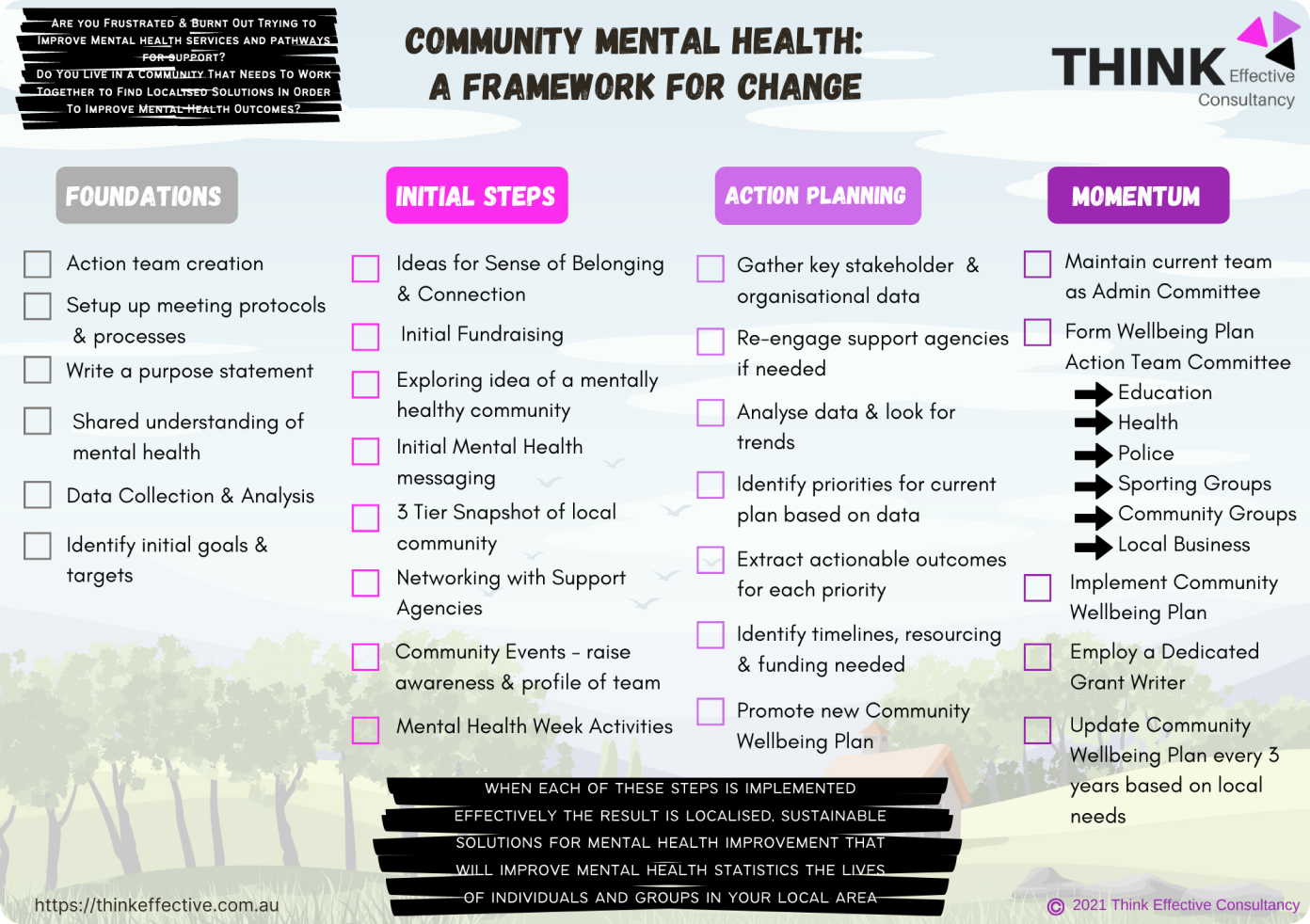5 Practical Ways To Increase Mental Health Acceptance Within Your Community

Table of Contents
Educate Yourself and Others About Mental Health
Understanding mental health is the first step towards acceptance. Dispelling myths and misconceptions is crucial for building a supportive community. Learning about different mental health conditions, their symptoms, and available treatments empowers you to become a better advocate and promotes mental wellness.
Understand the Facts:
Dispelling myths and misconceptions is crucial. Learning about different mental health conditions, their symptoms, and available treatments empowers you to become a better advocate.
- Read reputable resources: The National Alliance on Mental Illness (NAMI), the Mental Health America (MHA), and the World Health Organization (WHO) offer reliable information on various mental health conditions, their symptoms, and treatment options. These resources provide evidence-based information to counter misinformation and stigma.
- Attend workshops or webinars: Many organizations host workshops and webinars on mental health awareness. These events provide opportunities to learn from experts and connect with others interested in promoting mental health acceptance. Look for local community centers, hospitals, or universities offering such events.
- Engage with credible online resources: Reputable websites and online platforms offer valuable information on mental health. However, always verify the credibility of sources to ensure accuracy and avoid perpetuating misinformation. Look for resources affiliated with professional organizations or government agencies.
Start Conversations:
Openly talking about mental health normalizes it and encourages others to do the same. Sharing personal experiences (if comfortable) helps break down barriers and creates a sense of community.
- Share your own experiences (if comfortable): Sharing your story, if you feel comfortable, can be incredibly powerful. It shows vulnerability and can help others feel less alone in their struggles. Remember to prioritize your own well-being and only share what you feel comfortable with.
- Participate in community discussions: Join online forums, attend community meetings, or participate in social media discussions about mental health. Sharing your perspective and engaging in respectful dialogue can contribute to increased understanding and mental health acceptance.
- Use social media to raise awareness: Social media provides a powerful platform to share information, resources, and positive messages about mental health. Use hashtags and share stories to reach a wider audience and promote awareness.
Challenge Stigma and Promote Understanding
Actively challenging stigma is essential for creating a truly inclusive community. This involves identifying and countering negative stereotypes, and actively promoting understanding and empathy.
Identify and Counter Negative Stereotypes:
Actively challenge stigmatizing language and attitudes whenever you encounter them. This requires both individual action and collective effort.
- Correct misconceptions and offer factual information: When you hear inaccurate or harmful statements about mental illness, gently correct them with factual information from credible sources. Explain that mental health conditions are treatable and that recovery is possible.
- Advocate for inclusive language: Avoid using stigmatizing language that labels or judges individuals with mental health conditions. Use person-first language (e.g., "person with depression" instead of "depressed person") and avoid using terms like "crazy" or "insane."
- Speak up against discriminatory remarks or behaviors: If you witness someone making discriminatory remarks or exhibiting stigmatizing behavior, speak up respectfully but firmly. Let them know that their words or actions are hurtful and unacceptable.
Highlight Positive Stories:
Sharing stories of recovery and resilience demonstrates that mental health challenges are surmountable. This helps shift the narrative from one of despair to one of hope and possibility.
- Share personal stories (with consent): If individuals are willing to share their experiences, their stories can inspire hope and understanding. Always obtain their consent before sharing their personal information.
- Highlight successful community initiatives: Showcase the positive work being done in your community to support mental wellness. This could include local support groups, mental health awareness campaigns, or initiatives promoting mental health in schools or workplaces.
- Amplify the voices of individuals sharing their journeys: Use your platform (social media, community events, etc.) to amplify the voices of individuals who are bravely sharing their stories and advocating for mental health acceptance.
Support Local Mental Health Initiatives
Contributing your time, resources, or financial support to local mental health organizations amplifies the impact of their work and fosters a more supportive community.
Volunteer Your Time:
Many organizations rely on volunteers to provide support and resources. Volunteering your time can make a significant difference in the lives of those struggling with mental health challenges.
- Volunteer at local mental health clinics or support groups: Offer your time and skills to assist with administrative tasks, event planning, or direct support to individuals.
- Help organize awareness events or fundraisers: Participate in organizing events to raise awareness and funds for vital mental health services.
- Offer administrative or logistical support: Many organizations need help with tasks such as data entry, grant writing, or website maintenance.
Donate to Mental Health Charities:
Financial contributions help organizations provide essential services, such as therapy, support groups, and educational programs.
- Research reputable mental health charities: Identify local and national organizations that align with your values and priorities.
- Consider recurring donations: Regular donations provide consistent support for ongoing programs and services.
- Explore fundraising opportunities: Organize a fundraiser or participate in existing fundraising campaigns to raise money for mental health causes.
Create Supportive Environments in Your Workplace and Community
Creating supportive environments where people feel comfortable discussing mental health is crucial for fostering acceptance. This involves advocating for supportive policies and fostering open communication.
Advocate for Mental Health Policies:
Encourage your workplace and community to implement policies that support mental well-being. This can involve advocating for specific changes or promoting existing resources.
- Advocate for mental health days and flexible work arrangements: Support policies that allow employees to take time off when needed to address their mental health needs without penalty.
- Promote access to employee assistance programs (EAPs): Ensure that EAPs are widely known and utilized within your workplace.
- Support the implementation of mental health training programs: Advocate for training programs that educate employees on mental health awareness, stigma reduction, and how to support colleagues.
Foster a Culture of Open Communication:
Create spaces where people feel comfortable talking openly about mental health. This requires creating a safe and supportive environment where individuals feel comfortable sharing their experiences.
- Encourage open dialogue: Initiate conversations about mental health in your workplace or social circles. Create opportunities for open discussion and sharing.
- Provide a safe space for sharing personal experiences: Make it clear that it’s okay to talk about mental health and that you’ll listen without judgment.
- Promote active listening and empathetic responses: Practice active listening and show empathy when someone shares their mental health experiences.
Seek Professional Help When Needed
Knowing where to find resources and encouraging others to seek help are vital components of increasing mental health acceptance.
Know Where to Find Resources:
Familiarize yourself with local mental health services and support groups. This knowledge empowers you to provide support and guidance to those in need.
- Locate local mental health clinics and hospitals: Research local mental health services to understand what resources are available in your community.
- Identify support groups tailored to specific mental health conditions: Many support groups cater to individuals facing specific challenges. Finding the right group can be incredibly helpful.
- Access online resources and helplines: Many online resources and helplines offer support and guidance. These can be invaluable resources for individuals seeking help.
Encourage Others to Seek Help:
Helping reduce the stigma involves encouraging individuals struggling with mental health to seek professional assistance. Your support can make a crucial difference.
- Offer support and encouragement: Let those struggling know that they're not alone and that help is available.
- Provide information on available resources and treatment options: Share information about local mental health services, therapists, and support groups.
- Help them navigate the process of finding a therapist or counselor: Offer practical assistance in finding appropriate help, such as helping them research therapists or making appointments.
Conclusion:
Increasing mental health acceptance within our communities requires a collective effort. By educating ourselves, challenging stigma, supporting local initiatives, creating supportive environments, and encouraging help-seeking behaviors, we can create a more compassionate and understanding world for everyone. Remember, even small actions can make a significant difference in promoting mental health acceptance and mental wellness. Let's work together to build communities where everyone feels supported and understood. Start taking action today to improve mental health acceptance in your community!

Featured Posts
-
 Fortnite Cosmetic System Overhaul Refunds Offer Clues
May 03, 2025
Fortnite Cosmetic System Overhaul Refunds Offer Clues
May 03, 2025 -
 The Conservatives Last Hope A Boris Johnson Return
May 03, 2025
The Conservatives Last Hope A Boris Johnson Return
May 03, 2025 -
 Fans React To Christina Aguileras Altered Appearance
May 03, 2025
Fans React To Christina Aguileras Altered Appearance
May 03, 2025 -
 Bbcs Celebrity Traitors Faces Setback Sibling Dropouts Weeks Before Production
May 03, 2025
Bbcs Celebrity Traitors Faces Setback Sibling Dropouts Weeks Before Production
May 03, 2025 -
 The Calibri Ms 13 Tattoo Confusion Analyzing Donald Trumps Remarks
May 03, 2025
The Calibri Ms 13 Tattoo Confusion Analyzing Donald Trumps Remarks
May 03, 2025
